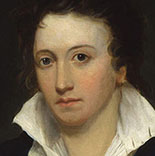 Percy Bysshe Shelley (August 4, 1792 – July 8, 1822) was one of the major English Romantic poets, and is regarded by some critics as amongst the finest lyric poets in the English language.
Percy Bysshe Shelley (August 4, 1792 – July 8, 1822) was one of the major English Romantic poets, and is regarded by some critics as amongst the finest lyric poets in the English language.
A radical in his poetry as well as his political and social views, Shelley did not achieve fame during his lifetime, but recognition for his poetry grew steadily following his death. Shelley was a key member of a close circle of visionary poets and writers that included Lord Byron; Leigh Hunt; Thomas Love Peacock; and his own second wife, Mary Shelley, the author of Frankenstein.
Shelley did not live to see success and influence, although these reach down to the present day not only in literature, but in major movements in social and political thought.
LOVE’S PHILOSOPHY
Percy Bysshe Shelley
The fountains mingle with the river,
And the rivers with the ocean;
The winds of heaven mix forever
With a sweet emotion;
Nothing in the world is single;
All things by a law divine
In another’s being mingle–
Why not I with thine?
See, the mountains kiss high heaven,
And the waves clasp one another;
No sister flower could be forgiven
If it disdained its brother;
And the sunlight clasps the earth,
And the moonbeams kiss the sea;–
What are all these kissings worth,
If thou kiss not me?
=========
PROMETHEUS UNBOUND
Percy Bysshe Shelley
This is the day, which down the void abysm
At the Earth-born’s spell yawns for Heaven’s despotism,
And Conquest is dragged captive through the deep:
Love, from its awful throne of patient power
In the wise heart, from the last giddy hour
Of dead endurance, from the slippery, steep,
And narrow verge of crag-like agony, springs
And folds over the world its healing wings.
Gentleness, Virtue, Wisdom, and Endurance,
These are the seals of that most firm assurance
Which bars the pit over Destruction’s strength;
And if, with infirm hand, Eternity,
Mother of many acts and hours, should free
The serpent that would clasp her with his length;
These are the spells by which to re-assume
An empire o’er the disentangled doom.
To suffer woes which Hope thinks infinite;
To forgive wrongs darker than death or night;
To defy Power, which seems omnipotent;
To love, and bear; to hope till Hope creates
From its own wreck the thing it contemplates;
Neither to change, nor falter, nor repent;
This, like thy glory, Titan, is to be
Good, great and joyous, beautiful and free;
This is alone Life, Joy, Empire, and Victory.